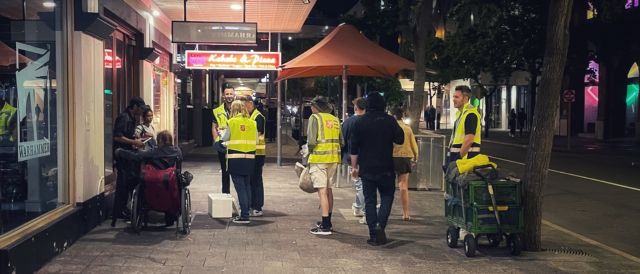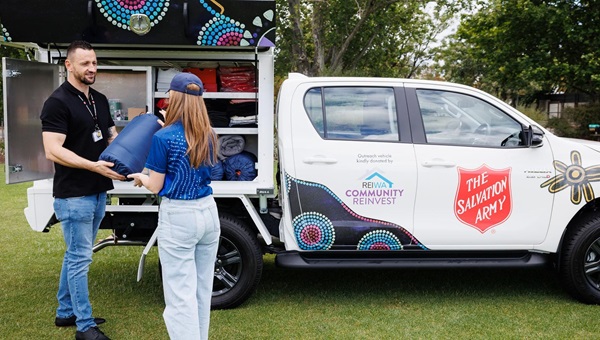Sometimes you meet someone whose dedication and compassion leave a lasting impression. Brett McCaul, The Salvation Army’s Assertive Outreach Team Leader, is one of those people.
Brett walks the streets with his team of volunteers, delivering food, essentials and, most importantly, hope to those in need. With his approachable and non-judgemental demeanour, Brett builds trust, offering assistance and resources without pressure, empowering people to take steps towards change – on their own terms.
We caught up with Brett to find out a bit more about what makes him tick, what drives his commitment and how he deals with the challenges of helping those most vulnerable.
Q: Can you share your journey and how you became involved in this area?
I began my career in the community services sector within the Alcohol and Other Drugs (AOD) field, motivated by a personal connection to the work. After several years in this area, I transitioned into roles focused on supporting Aboriginal teenagers from remote communities, primarily from the Kimberley and Pilbara regions of Western Australia. The experiences I gained during this time provided a strong foundation for my current role, where I support individuals experiencing homelessness through assertive outreach programs.
I find it very easy to relate to people and to build trust and rapport, rooted in a deep understanding of the challenges people face. These cumulative experiences have aligned perfectly, allowing me to contribute effectively to supporting vulnerable people in our community.
Q: What inspired you from your time working with Aboriginal communities?
I have never experienced such joy and laughter. The individuals that I worked with were incredibly lively, energetic and often true athletes. Like myself, they share a deep passion for sports and physical activity.
At the core of their values is family; it is the most important aspect of their lives. Material possessions hold little significance to them. Their happiness is found in simple moments – gathering in a park or around a fire, enjoying conversation. They can take a few sticks, a bucket and some rocks, and effortlessly create music and sing together. There is a refreshing absence of the typical concerns that often preoccupy Western life.
Q: How long have you been with The Salvation Army?
I have been working in the homelessness sector for about three years and have been with The Salvation Army for the past five months. I am thoroughly enjoying my role, as it reaffirms the reasons I entered this field. The organisation is truly inspiring, and it is a privilege to contribute to its mission and purpose.

Q: What inspires you to get up each day in such a demanding line of work?
Over the years, I have gained experience across various industries, with the past eight years dedicated to the community services sector. I have found my true purpose in this field and have no desire to return to other industries.
The opportunity to make a tangible difference in people's lives is a constant source of motivation, even on challenging days. Returning home to my family each evening, knowing that I have contributed to something meaningful, brings an added sense of fulfillment.
I cannot imagine working outside of this sector.
Q: What’s behind the increase in homelessness?
We are currently facing a situation where it is increasingly unaffordable for individuals on welfare payments to access housing through the private rental market. People receive welfare support for various reasons, including mental health challenges, substance abuse, and family and domestic violence (FDV). For many, securing employment is often a later stage in their overall support plan. For this reason, among many others, transitional/crisis accommodation services are often at capacity as more and more people continue to experience homelessness.
Our approach is person-centred, meaning that the individual is at the core of their own support plan. We prioritise their preferences and needs, ensuring that they are not forced into housing options they do not want or placed in accommodation services that do not suit their individual needs. This approach is critical, as failing to align support with their needs, risks setting them up for failure.
Q: Is a certain demographic more affected than others?
Recent statistics have shown that one of the fastest-growing demographics of people experiencing homelessness is women over the age of 55. Many older women, along with families, are living in cars, highlighting the broad spectrum of individuals affected by homelessness. We are seeing a notable presence of individuals experiencing homelessness across all demographics, with Aboriginal and Torres Strait Islander peoples unfortunately representing a significant proportion of the rough sleeping population.
With escalating living costs and a shortage of affordable housing, many individuals and even middle-class families are finding themselves without shelter. Addressing this issue requires collective action, including the development of more affordable housing, targeted support programs and a broader community understanding of the challenges associated with homelessness.

CASE STUDY
Client: Female, aged 42
Program: Wanneroo Engagement Assessment Team
Subject: Support into Family Accommodation
Client Goals: Secure stable, long-term accommodation for her and her four children, and keep her children in school. Future goals included securing stable employment and financial security.
Client Introduction/Presentation:
Client was referred to the WEAT team by No Limits, City of Wanneroo and local community members. Client presented as a single parent sleeping rough in her car with four children in her care.
Background/History:
Client was forced to vacate her previous rental due to the landlord selling the property and were unable to secure another rental in the current market. The team met with her and her children at a local park which was their base during the daytime; they were sleeping in their car at night.
Barriers/Complexities/Challenges:
Parenting four children while living in a car presented various challenges. Financial hardship due to rental market being unaffordable and unavailable.
Support Provided:
Team provided her with a phone, food vouchers, fuel vouchers, school uniforms and respite at a hotel. The family stayed at a community member’s house after the hotel. The team were able to support her to get waitlisted for the Family Accommodation Program at The Salvation Army and follow up her Department of Housing application.
Outcomes:
After four weeks on the waitlist, the client was offered transitional housing for her family through Centre Care’s family accommodation program in Belmont.
Summary:
Client and her children now have secure accommodation until she receives her property from the Department of Housing. The children have continued to attend school.
Part 2 coming next week: Tackling homelessness together



.tmb-rcarousel.png?sfvrsn=b7e87578_1)


.tmb-rcarousel.jpg?sfvrsn=b4b9111_1)


.tmb-rcarousel.jpg?sfvrsn=d38b03f0_1)
